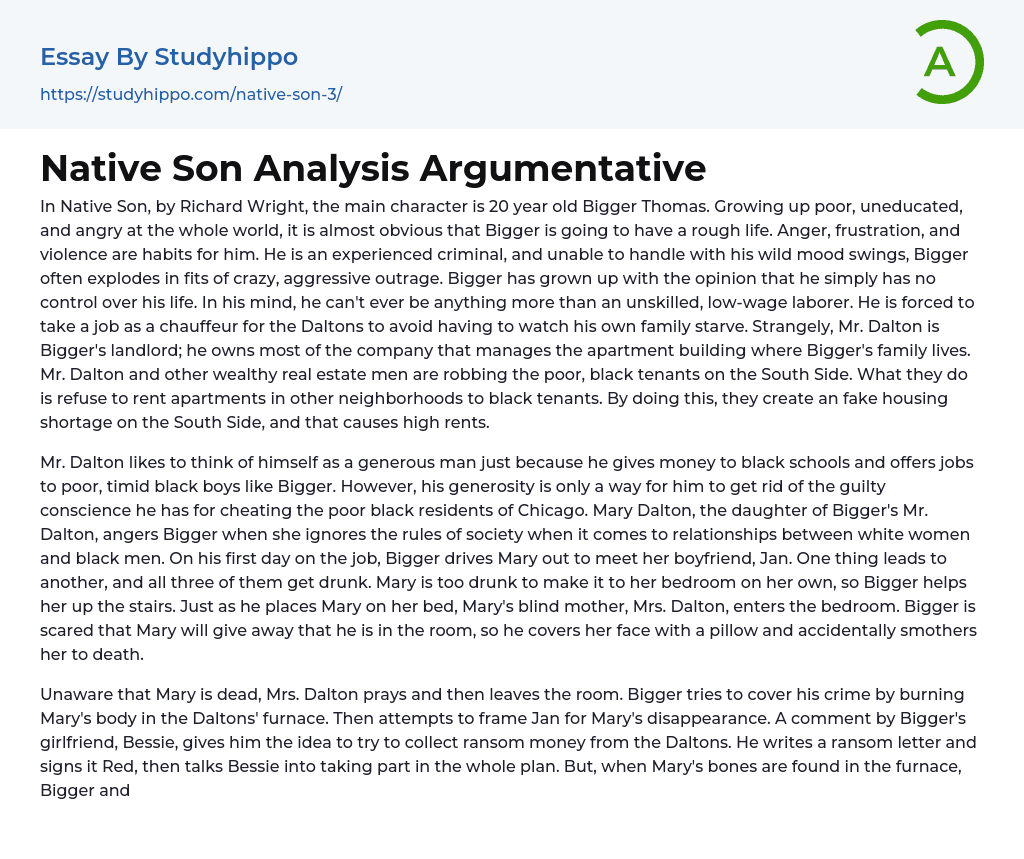In Native Son, Bigger Thomas, a 20-year-old character created by Richard Wright, grapples with a difficult existence. Born into poverty and lacking education, Bigger harbors a deep-seated anger towards society. This perpetual frustration leads him down a path of habitual violence and criminal activity. Incapable of managing his volatile emotions, Bigger frequently succumbs to fits of irrational and aggressive behavior. Raised with the belief that he possesses no agency over his own life, Bigger navigates a tumultuous journey filled with anger and despair.
He feels trapped in the position of a poorly paid, unskilled worker indefinitely. To avoid his family from starving, he must work as a chauffeur for the Daltons. It is worth noting that Mr. Dalton is both his landlord and has majority control over the company managing the apartment complex where his family lives. Together with other wealthy p
...roperty owners, Mr. Dalton exploits the impoverished black residents on the South Side.
They engage in the act of denying black tenants the opportunity to rent apartments in different neighborhoods. This tactic creates an artificial housing scarcity in the South Side, resulting in elevated rents. Mr. Dalton views himself as benevolent due to his donations to black schools and employment opportunities for impoverished, shy black boys like Bigger. Nonetheless, his acts of generosity merely serve as a means for him to alleviate the guilt stemming from exploiting impoverished black Chicago residents.
Mary Dalton, the daughter of Mr. Dalton who employs Bigger, incites Bigger's anger by disregarding societal norms regarding interracial relationships. For his first day at work, Bigger chauffeurs Mary to rendezvous with her boyfriend, Jan. As the evening unfolds, they all become intoxicated. Due t
Mary's extreme drunkenness, Bigger assists her in reaching her bedroom by assisting her up the stairs.
While placing Mary on her bed, Bigger gets startled by the entrance of Mrs. Dalton, Mary's blind mother. Fearing that Mary might reveal his presence, he covers her face with a pillow, unintentionally causing her death. Unaware of Mary's demise, Mrs. Dalton offers her prayers before exiting the room.
In an attempt to cover up his crime, Bigger decides to burn Mary's body in the furnace belonging to the Daltons. He further tries to divert suspicion by framing Jan for Mary's disappearance. Bigger's girlfriend, Bessie, unintentionally provides him with the idea to extort money from the Daltons. Bigger proceeds to write a ransom letter, signing it as Red, and convinces Bessie to be involved in their plan. However, their plan goes awry when Mary's remains are discovered in the furnace. Fearing that Bessie may expose him, Bigger and Bessie flee to an abandoned building. Overwhelmed by fear of getting caught, Bigger sexually assaults and ultimately kills Bessie by beating her with a brick.
Bigger is being pursued by everyone, as they try to apprehend him and send him to jail. He successfully evades the extensive search for as long as possible, but eventually gets captured after a major shootout. Even prior to his trial commencing, both the media and the general public have already made up their minds that he is guilty and deserves punishment. They all presume that Bigger sexually assaulted Mary before killing her and burned her body in order to conceal any evidence. The white authorities, along with a mob, exploit Bigger as an excuse to terrorize the entire
South Side neighborhood. Jan initially feels profound sadness over Mary's death but later realizes that he also bears some responsibility.
He acknowledges that his expectation for Bigger to treat him differently from other white men was mistaken. Jan also recognizes that he disregarded the established guidelines for race interactions. This disregard frustrates and humiliates Bigger. Jan convinces his friend, Boris A. Max, to provide free legal representation for Bigger.
He attempts to prevent Bigger from receiving a death sentence by contending that Bigger's actions were a result of the environment he was raised in. Max cautions society about the likelihood of more individuals like Bigger emerging if America fails to break the vicious cycle of hatred and retribution. However, despite the trial's conclusion, Bigger is still condemned to capital punishment.
- Criminal Justice System essays
- Jurisprudence essays
- Social Injustice essays
- Juvenile Justice essays
- Animal Cruelty essays
- Charles Manson essays
- Crime Prevention essays
- Crime scene essays
- Criminal Justice essays
- Criminology essays
- Cyber Crime essays
- Damages essays
- Detention essays
- Distracted Driving essays
- Drug Trafficking essays
- Drunk Driving essays
- Forensic Science essays
- Gang essays
- Hate Crime essays
- Homicide essays
- Identity Theft essays
- Juvenile Crime essays
- Juvenile Delinquency essays
- Juvenile Justice System essays
- Law Enforcement essays
- Murder essays
- Organized Crime essays
- Penology essays
- Piracy essays
- Prison essays
- Property Crime essays
- Prostitution essays
- Punishment essays
- Punishments essays
- Rape essays
- Robbery essays
- Serial Killer essays
- Sexual Assault essays
- Sexual Assault on College Campuses essays
- Sexual Harassment essays
- Sexual Offence essays
- Stealing essays
- Surveillance essays
- Ted Bundy essays
- Victim essays
- Violent crime essays
- White Collar Crime essays
- Agreement essays
- Business Law essays
- Common Law essays




